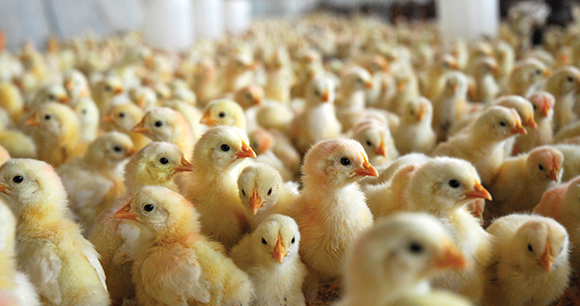Public Supports Egg-Check Tech to Prevent Chick Culling
A recent, first-of-its-kind survey of more than 1,000 US egg consumers showed a high level of interest in a new technology called “in-ovo sexing” that can determine the sex of chicken embryos before they have hatched. Of survey respondents, 47 percent were “extremely” or “very” interested in eggs produced using in-ovo sexing, and 71 percent were willing to pay a premium for such eggs.

These results are highly encouraging, because in-ovo sexing could save hundreds of millions of chicks each year from an inhumane death. In the United States, around 300 million day-old male chicks are culled annually because they are useless to the egg industry: They cannot lay eggs, and they do not grow fast enough to be economically raised for meat. As a result, they are killed shortly after hatching, typically by maceration (dropped into a high-speed grinder and shredded alive) or suffocation (dumped into large plastic bags).
Spurred by chick-culling bans in places such as Germany and France, in-ovo sexing technology is now being used in several European countries. While it is not yet commercially available in the United States, major industry stakeholders such as United Egg Producers and Vital Farms have expressed interest in its use. In addition, the Foundation for Food and Agriculture Research and Open Philanthropy are jointly offering a $6 million “Egg-Tech Prize” to the first applicant who can develop in-ovo sexing for commercial use in the United States that meets certain criteria, including capacity to detect sex by the eighth day of incubation (to avoid causing pain) with 98 percent accuracy, and ability to process at least 15,000 eggs per hour.
Program Terms: Farmed Animals
Related News
Titus Reintroduces Humane Transport of Farmed Animals Act as New AWI Report Reveals Feeble Enforcement of Welfare Violations
In Program: Farmed AnimalsToday, US Rep. Dina Titus (D-NV) reintroduced the Humane Transport of Farmed Animals Act to improve conditions for livestock transported across the United States. The bill would...
New Poll: Consumers Overwhelmingly Support Meaningful Standards for “Humanely Raised” Food Label
In Program: Farmed AnimalsEighty-eight percent of American consumers believe that claims such as “humanely raised” or “sustainably farmed” on meat and poultry products should be based on meaningful,...
New Research: USDA Fails to Pursue Prosecutions of Slaughter Plants, Despite Repeat Violations
In Program: Farmed AnimalsRepeat violators of the federal Humane Methods of Slaughter Act (HMSA) continue to escape meaningful enforcement by the US Department of Agriculture, resulting in continued...
AWI Scholarship Winners Campaign for a Better World for Animals
In Program: Animals in Laboratories, Farmed AnimalsThe Animal Welfare Institute (AWI) announced today the 12 winners of a scholarship designed to invest in future leaders who seek to improve the lives...